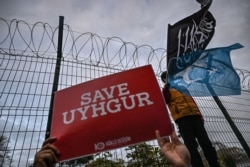Indonesia’s top Muslim clerical organization has dismissed a Wall Street Journal report that local Muslim organizations had received donations, financial support and other forms of assistance in return for keeping quiet about China’s treatment of its Uighurs.
“The allegation that the Islamic organizations receive large funds is very painful and discredits us at the same time. It's the same as character assassination,” said Muhyidin Junaidi, chairperson of the Foreign Relations and International Cooperation of the Indonesia’s Council of Islamic Clerics (Ulema), better known as MUI.
Muhyidin – who led the Chinese-funded delegation to Xinjiang last February – told VOA by telephone: “We cannot be bought with money. We, God willing, are strict and we have high integrity for the sake of truth.” According to the International Consortium of Investigative Journalists (ICIJ), China is waging a campaign of surveillance, political and cultural indoctrination against Uighurs, Kazakhs and other Muslim ethnic groups in Xinjiang.
Original report
In its December 11 edition, The Wall Street Journal (WSJ) reported that in an effort to gain international support and to shape positive public opinion, China funded the visit of a group of Indonesian religious leaders, community leaders and journalists to Xinjiang.
“... bolstered by donations and other financial support, China helped blunt criticism of its treatment of the Uighurs by Muslim-majority countries, in contrast to the strong condemnation expressed by the U.S. and other Western nations,” the WSJ report said.
The WSJ further reported how the perception in Indonesia of the treatment of the Muslim minorities by China has changed since the visit to several training centers and presentations by Chinese authorities on the dangers of terrorist attacks by the Uighurs.
Allegations denied
In an interview with VOA on February 24, shortly after the trip to Xinjiang, Robikin Emhas, the executive board chief of Nahdlatul Ulema (NU), Indonesia’s largest Islamic organization, denied that the Chinese government was arresting and persecuting Muslim Uighurs. He also dismissed the existence of “concentration camps” in Xinjiang.
“I did not find the exile camps and prisons as referred to in the news,” Emhas stressed in the interview.
China is estimated to have detained up to 1 million minority Muslim Uighurs in prison-like detention centers. The detentions come on top of harsh travel restrictions and a massive state surveillance.
Emhas said the delegation visited Hotan and Kashgar in Xinjiang Province, where he appealed to the local authorities to allow the Uighurs to practice their faith.
“... We remain hopeful that freedom to embrace religion is also accompanied by freedom to practice it in worship, wherever and whenever, according to the provisions of each religion,” he told VOA, adding that observing a faith is “a fundamental right.”
Minimal interaction
Muhyidin Junaidi, the MUI chairman, said the Indonesian delegation had requested that a meeting with Uighurs without restrictions and supervision. He said that the goal was for the Indonesian delegation to get accurate and balanced information.
“But facts on the ground were different as everything had been prearranged in such a way. The schedule was very tight. There was no access to interact with the local community without escort,” he said, adding that “reporters were not allowed to cover news without an escort.”
Muhyidin said the delegation also including leaders of Muhammadiyah, Indonesia’s second largest Islamic organization. According to Muhyidin, the group was only invited to the Vocational Training Center, where the Muslim participants were considered “radicals” by Chinese authorities.
“During the training, they are prohibited from worshiping, fasting and reading the Quran,” Muhyidin said. “They are under close surveillance, with CCTV cameras in every corner. Their activities are always monitored.”
Muhyidin stressed that in the wake of the trip, the Indonesian delegation had released a report submitted to Foreign Minister Retno Marsudi. “We asked that the report be immediately submitted to the Chinese ambassador in Jakarta,” he said.
China’s issues
In a meeting with the media in Jakarta on Monday, Deputy Director of Civil and Political Rights, Ministry of Foreign Affairs, Indah Nuria Savitri said, “Indonesia has concerns about the Uighurs, but we prioritized the mechanism of bilateral consultation and discussion with China. China has an internal mechanism and we respect it.”
Indah Nuria stressed that Indonesia believed China has the capability to resolve its internal issue.
Indonesia’s Foreign Ministry said it did not dispute nor accept the existence of detention camps holding Uighurs and other Muslims.
“The internal settlement must be respected and China has done it. We are just waiting for the progress,” she said.
Secret Documents
A trove of documents, obtained and published by the International Consortium of Investigative Journalists (ICIJ), revealed the blueprints and tactics behind an intensifying campaign against Uighurs, Kazakhs and other Muslim ethnic groups in Xinjiang.
The leaked internal documents and communications were obtained and published last month. This followed the leak of 400 pages of internal documents to The New York Times.
On November 25, Chinese Foreign Ministry spokesperson Geng Shuang refuted the new document leak, saying issues surrounding Uighur Muslims are "purely China's internal affairs."
Background reporting by Nike Ching is included in this report.






